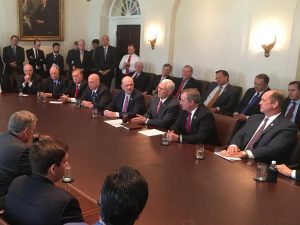The Trump administration has recently escalated its attacks on the health system under the Affordable Care Act (ACA) and continues to undermine the ability of Americans – particularly low-income women and individuals with pre-existing conditions – to access affordable and comprehensive healthcare coverage. These policy decisions – which come at the same time as a U.S. Supreme Court ruling with implications for access to reproductive healthcare services – are certain to erode the healthcare coverage gains made since 2010 and create significant harm, risk, and uncertainty for some of America’s most vulnerable populations.
The Centers for Medicare & Medicaid Services (CMS) on July 10 announced that it would further cut grants to nonprofit organizations that assist individuals in signing up for health insurance coverage on the ACA’s individual market. The federal government provided $63 million to such organizations in 2016, $36 million in 2017, and will provide only $10 million this year – a total reduction of roughly 84 percent. CMS, in another significant shift, will also encourage such organizations to enroll individuals in Association Health Plans (AHPs) as opposed to the more comprehensive ACA health plans. These plans – which the administration expanded last month and which ANA strongly opposes – offer coverage without essential health benefits guarantees and will disadvantage individuals with pre-existing conditions.
The administration argues that insurance companies and brokers are much better at enrolling individuals into insurance plans, and that AHPs offer a less expensive option for Americans struggling to pay for health insurance. However, despite major outreach efforts last year by outside groups – including ANA – to enroll individuals in ACA plans, enrollment dipped for the first time since the law was implemented. Meanwhile, the expansion of AHPs will result in higher premiums and fewer coverage options for Americans with pre-existing conditions, while individuals who purchase coverage through an AHP will have less comprehensive coverage than what is required of ACA health plans.
The administration on July 7 also announced that it would suspend billions of dollars in risk adjustment payments required by the ACA to be paid to insurance companies. These payments are intended to stabilize the individual market by preventing insurance companies from only seeking out healthy individuals and encouraging them to promote coverage for individuals with costly pre-existing conditions.
Suspending these payments creates uncertainty in the individual market, just as insurance companies are determining premiums for calendar year 2019, and could significantly increase premiums in the individual market. The administration’s moves to expand the use of AHPs and decrease the amount of funding available for outreach could be disastrous for individuals who purchase health coverage through the individual market and will likely lead to another year in which the number of Americans without health insurance coverages rises.
The administration, however, has not only taken aim at the ACA’s healthcare coverage regulations. In June, the administration issued a proposal to change regulations related to Title X funding, which provides grants for critical family planning services for millions of Americans, particularly low-income women. This proposed rule would prohibit a recipient of Title X funding from “performing, promoting, referring for, or supporting, abortion as a method of family planning, nor take any other affirmative action to assist a patient to secure such an abortion.” This represents a gag order on providers and denies patients full medical information. This was recently bolstered by the U.S. Supreme Court ruling in NIFLA v. Becerra, where the Court ruled that it is unconstitutional on First Amendment grounds for the state of California to require family planning facilities to post information about state-sponsored abortion services.
This is antithetical to the Code of Ethics for Nurses which states that the nurse’s primary commitment is to the patient, whether an individual, family, group, community, or population. This proposed rule interferes with that relationship and violates basic ethics of the profession, while threatening the ability of millions of Americans to access basic, preventive reproductive health care, such as birth control, cancer screenings, STI testing and treatment, and well-woman exams. The uninsured, women of color and low-income families will be disproportionately affected if the clinics and health centers in their communities can no longer offer the needed care and critical medical information.
ANA firmly believes in universal access to comprehensive and affordable healthcare services for all Americans. The recent moves by the Trump administration fly directly in the face of that goal and represent major steps backward in the effort to ensure that all Americans – especially vulnerable populations such as low-income women and those with pre-existing conditions – have access to all necessary healthcare services. The midterm elections this November are an incredibly important opportunity for ANA’s members to make their voices heard when it comes to determining the future of healthcare in this country. We urge you to make nursing’s voice heard loud and clear by supporting candidates who align with ANA’s principles for health system transformation and who are proven to be advocates for nurses and their patients!

 Earlier this week, the Senate passed a resolution amending the
Earlier this week, the Senate passed a resolution amending the